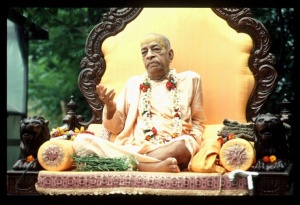SB 11.2.19: Difference between revisions
m (1 revision(s)) |
(Vanibot #0054 edit - transform synonyms into clickable links, which search similar occurrences) |
||
| (One intermediate revision by one other user not shown) | |||
| Line 1: | Line 1: | ||
{{info | {{info | ||
|speaker= | |speaker=Nārada Muni | ||
|listener=King Vasudeva | |listener=King Vasudeva | ||
}} | }} | ||
[[Category:Srimad-Bhagavatam - Canto 11 Chapter 02]] | |||
[[Category:Bhagavatam Verses Spoken by Narada Muni - Vanisource|110219]] | |||
<div style="float:left">'''[[Srimad-Bhagavatam]] - [[SB 11|Eleventh Canto]] - [[SB 11.2: Maharaja Nimi Meets the Nine Yogendras|Chapter 2: Mahārāja Nimi Meets the Nine Yogendras]]'''</div> | |||
<div style="float:right">[[File:Go-previous.png|link=SB 11.2.18]] '''[[SB 11.2.18]] - [[SB 11.2.20-21]]''' [[File:Go-next.png|link=SB 11.2.20-21]]</div> | |||
{{RandomImage}} | |||
{{SBnotice}} | |||
==== TEXT 19 ==== | ==== TEXT 19 ==== | ||
<div | <div class="verse"> | ||
teṣāṁ nava nava-dvīpa- | :teṣāṁ nava nava-dvīpa- | ||
patayo 'sya samantataḥ | :patayo 'sya samantataḥ | ||
karma-tantra-praṇetāra | :karma-tantra-praṇetāra | ||
ekāśītir dvijātayaḥ | :ekāśītir dvijātayaḥ | ||
</div> | </div> | ||
| Line 17: | Line 22: | ||
==== SYNONYMS ==== | ==== SYNONYMS ==== | ||
<div | <div class="synonyms"> | ||
''[//vanipedia.org/wiki/Special:VaniSearch?s=teṣām&tab=syno_o&ds=1 teṣām]'' — of them (the one hundred sons of Ṛṣabhadeva); ''[//vanipedia.org/wiki/Special:VaniSearch?s=nava&tab=syno_o&ds=1 nava]'' — nine; ''[//vanipedia.org/wiki/Special:VaniSearch?s=nava&tab=syno_o&ds=1 nava]-[//vanipedia.org/wiki/Special:VaniSearch?s=dvīpa&tab=syno_o&ds=1 dvīpa]'' — of the nine islands (comprising Bhārata-varṣa); ''[//vanipedia.org/wiki/Special:VaniSearch?s=patayaḥ&tab=syno_o&ds=1 patayaḥ]'' — the masters; ''[//vanipedia.org/wiki/Special:VaniSearch?s=asya&tab=syno_o&ds=1 asya]'' — of this varṣa; ''[//vanipedia.org/wiki/Special:VaniSearch?s=samantataḥ&tab=syno_o&ds=1 samantataḥ]'' — covering it entirely; ''[//vanipedia.org/wiki/Special:VaniSearch?s=karma&tab=syno_o&ds=1 karma]-[//vanipedia.org/wiki/Special:VaniSearch?s=tantra&tab=syno_o&ds=1 tantra]'' — of the path of fruitive Vedic sacrifices; ''[//vanipedia.org/wiki/Special:VaniSearch?s=praṇetāraḥ&tab=syno_o&ds=1 praṇetāraḥ]'' — initiators; ''[//vanipedia.org/wiki/Special:VaniSearch?s=ekāśītiḥ&tab=syno_o&ds=1 ekāśītiḥ]'' — eighty-one; ''[//vanipedia.org/wiki/Special:VaniSearch?s=dvi&tab=syno_o&ds=1 dvi]-[//vanipedia.org/wiki/Special:VaniSearch?s=jātayaḥ&tab=syno_o&ds=1 jātayaḥ]'' — twice-born brāhmaṇas. | |||
</div> | </div> | ||
{{SBcollapse}} | |||
==== TRANSLATION ==== | ==== TRANSLATION ==== | ||
<div | <div class="translation"> | ||
Nine of the remaining sons of Ṛṣabhadeva became the rulers of the nine islands of Bhārata-varṣa, and they exercised complete sovereignty over this planet. Eighty-one sons became twice-born brāhmaṇas and helped initiate the Vedic path of fruitive sacrifices [karma-kāṇḍa]. | Nine of the remaining sons of Ṛṣabhadeva became the rulers of the nine islands of Bhārata-varṣa, and they exercised complete sovereignty over this planet. Eighty-one sons became twice-born brāhmaṇas and helped initiate the Vedic path of fruitive sacrifices [karma-kāṇḍa]. | ||
</div> | </div> | ||
| Line 31: | Line 36: | ||
==== PURPORT ==== | ==== PURPORT ==== | ||
<div | <div class="purport"> | ||
The nine dvīpas, or islands, ruled by nine sons of Ṛṣabhadeva are the nine varṣas of Jambūdvīpa, namely Bhārata, Kinnara, Hari, Kuru, Hiraṇmaya, Ramyaka, Ilāvṛta, Bhadrāśva and Ketumāla. | The nine ''dvīpas'', or islands, ruled by nine sons of Ṛṣabhadeva are the nine ''varṣas'' of Jambūdvīpa, namely Bhārata, Kinnara, Hari, Kuru, Hiraṇmaya, Ramyaka, Ilāvṛta, Bhadrāśva and Ketumāla. | ||
</div> | </div> | ||
__NOTOC__ | </div> | ||
</div> | |||
<div style="float:right">[[File:Go-previous.png|link=SB 11.2.18]] '''[[SB 11.2.18]] - [[SB 11.2.20-21]]''' [[File:Go-next.png|link=SB 11.2.20-21]]</div> | |||
__NOTOC__ | |||
__NOEDITSECTION__ | |||
Latest revision as of 20:29, 17 February 2024

A.C. Bhaktivedanta Swami Prabhupada
Please note: The synonyms, translation and purport of this verse were composed by disciples of Śrīla Prabhupāda
TEXT 19
- teṣāṁ nava nava-dvīpa-
- patayo 'sya samantataḥ
- karma-tantra-praṇetāra
- ekāśītir dvijātayaḥ
SYNONYMS
teṣām — of them (the one hundred sons of Ṛṣabhadeva); nava — nine; nava-dvīpa — of the nine islands (comprising Bhārata-varṣa); patayaḥ — the masters; asya — of this varṣa; samantataḥ — covering it entirely; karma-tantra — of the path of fruitive Vedic sacrifices; praṇetāraḥ — initiators; ekāśītiḥ — eighty-one; dvi-jātayaḥ — twice-born brāhmaṇas.
Translation and purport composed by disciples of Śrīla Prabhupāda
TRANSLATION
Nine of the remaining sons of Ṛṣabhadeva became the rulers of the nine islands of Bhārata-varṣa, and they exercised complete sovereignty over this planet. Eighty-one sons became twice-born brāhmaṇas and helped initiate the Vedic path of fruitive sacrifices [karma-kāṇḍa].
PURPORT
The nine dvīpas, or islands, ruled by nine sons of Ṛṣabhadeva are the nine varṣas of Jambūdvīpa, namely Bhārata, Kinnara, Hari, Kuru, Hiraṇmaya, Ramyaka, Ilāvṛta, Bhadrāśva and Ketumāla.